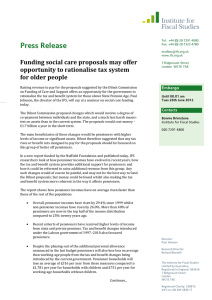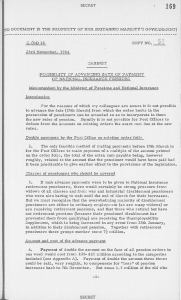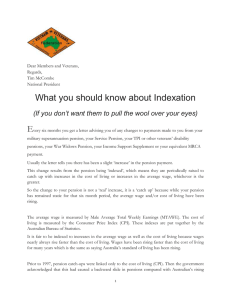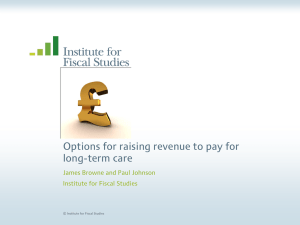Paying for Dilnot James Browne and Paul Johnson January 23, 2013
advertisement
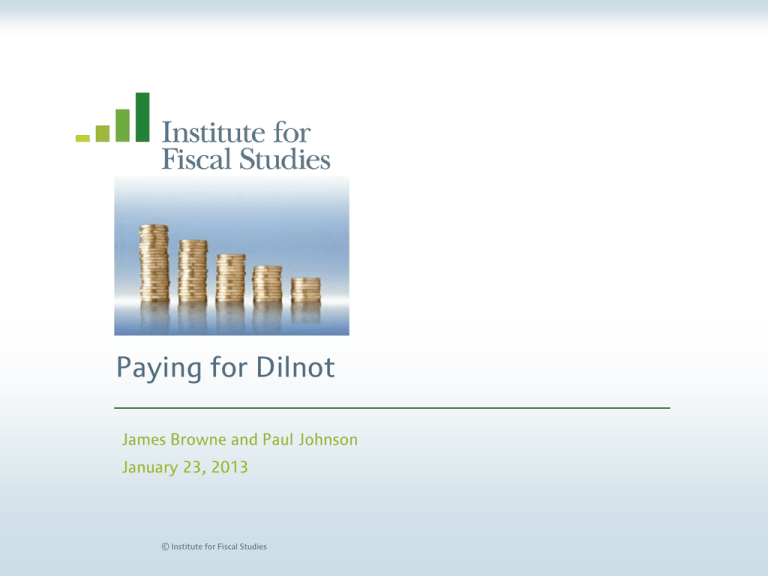
Paying for Dilnot James Browne and Paul Johnson January 23, 2013 © Institute for Fiscal Studies Paying for the Dilnot commission proposals • Dilnot benefits higher-income pensioners and those with more wealth – Could raise taxes or cut spending very slightly across the board... – ...or go for approach that is distributionally neutral by increasing taxes or cutting benefits for those who would gain from proposals © Institute for Fiscal Studies Background: pensioners have become a relatively richer group over time Pensioner median as % of median 95% 90% 85% 80% 75% 70% 65% 60% 55% 50% © Institute for Fiscal Studies Paying for the Dilnot commission proposals • Dilnot benefits higher-income pensioners and those with more wealth – Could raise taxes or cut spending very slightly across the board... – ...or go for approach that is distributionally neutral by increasing taxes or cutting benefits for those who would gain from proposals • Focus on second of these. Key question: – Are there coherent ways of ensuring that better off pensioners as a group pay for more generous social care funding? • Need to consider tax and benefit system as a whole: – What elements of the current tax and benefit system look less than coherent? – And how could they be reformed to raise money while enhancing coherence? © Institute for Fiscal Studies Principles for reform • Look for where the current system deviates from a coherent structure for supporting pensioners • Basic and earnings related pensions and pension credit represent a coherent system of support by themselves • Other additional benefits and tax reliefs need to be justified © Institute for Fiscal Studies Additional benefits • Winter fuel allowance and free TV licences – Go to all pensioners, not taxed or means-tested – Cost: £2.1 billion for WFPs and £0.6 billion for free TV licences – Just giving them to those on Pension Credit could save £1.5–£2 billion – Richer households lose, though biggest in percentage terms for those with incomes just above the cutoff for Pension Credit © Institute for Fiscal Studies Distributional impact among pensioners of means-testing Winter Fuel Payments Annual cash loss £0 0.0% -£50 -0.2% -£100 -0.4% -£150 -0.6% -£200 -0.8% Poorest 2 3 4 Richest All Quintile of pensioner income distribution Annual cash loss (left axis) © Institute for Fiscal Studies Loss as a % of income (right axis) Additional benefits • Winter fuel allowance and free TV licences – Go to all pensioners, not taxed or means-tested – Cost: £2.1 billion for WFPs and £0.6 billion for free TV licences – Just giving them to those on Pension Credit could save £1.5–£2 billion – Richer households lose, though biggest in percentage terms for those with incomes just above the cutoff for Pension Credit • Pros: – Why have separate benefit in the first place? – Those who benefit from Dilnot proposals pay • Cons: – IFS research has shown giving pensioners Winter Fuel Payments does increase their spending on fuel. If pensioners would otherwise spend a less than socially-optimal amount on fuel, may want to keep them – More means-testing: weakens incentive to save for retirement, increases complexity, take-up of Pension Credit fairly low © Institute for Fiscal Studies Also look at coherence of the tax system • No NICs on earnings after state pension age – cost £800 million – Imposing NICs would take money away from higher income pensioners – But might want lower tax rates for older workers as more responsive to incentives • Higher income tax personal allowances – Being phased out • Single person discount for Council Tax – Particularly valuable to pensioners • CGT is forgiven at death – cost £600 million – No justification for this: encourages people to hold onto assets when could be more profitably reinvested elsewhere – And IHT is probably in need of reform © Institute for Fiscal Studies Taxation of pensions • Tax neutral treatment of saving generally appropriate – Though probably want more generous treatment for pensions • Tax neutrality implies not taxing returns to saving, and either taxing contributions or pension income in retirement • In the UK pensions are treated in the following way: Income Tax National Insurance Employee contributions Exempt Taxed Employer contributions Exempt Exempt Returns Exempt Exempt Withdrawals Taxed, apart from 25% tax-free lump sum Exempt • Two divergences from neutrality: tax free lump sum, and employer contributions escaping NICs altogether © Institute for Fiscal Studies Potential reforms to taxation of pensions • Tax free lump sum costs £2.5 billion – Can get up to £312,500 tax free: limiting to higher rate threshold could save £500 million • Employer pension contributions not subject to NI at any point – Which is both distorting/unfair to those whose employer does not contribute and extraordinarily generous • Imposing NI on private pensions in payment could raise £350 million per 1p – Any such change would need to be phased in: would mean past employee contributions faced NICs on the way in and on the way out – Would also want offsetting NICs relief on employee contributions: overall cost in short run – Higher-income pensioners would lose the most from this... © Institute for Fiscal Studies Distributional effect of imposing full employee NI rate on private pension income Annual cash loss £0 0.0% -£250 -0.5% -£500 -1.0% -£750 -1.5% -£1,000 -2.0% -£1,250 -2.5% -£1,500 -3.0% -£1,750 -3.5% -£2,000 -4.0% Poorest 2 3 4 5 6 7 8 9 Richest Income decile group in cash terms © Institute for Fiscal Studies as a % of income All Conclusions • The “Dilnot reforms” would benefit better off pensioners • As a group, pensioners have done relatively well in recent years – Though their incomes are still below those of working age on average • The current tax and benefit system is not wholly rational in its treatment of pensioners – If one wanted to find money from better off pensioners to fund the Dilnot proposals one could, and improve coherence of system at the same time • Universal benefits like winter fuel allowances and free TV licences could be means-tested, abolished, or consolidated into the Basic State Pension or Pension Credit • CGT at death, NICs and tax treatment of pensions could all be reformed in ways that raise money and increase coherence © Institute for Fiscal Studies




